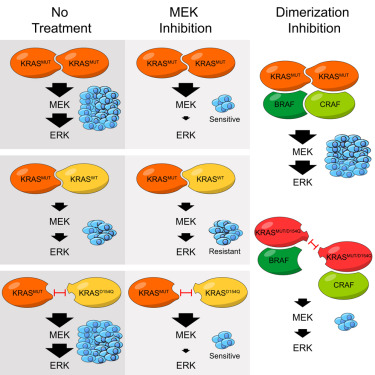Our official English website, www.x-mol.net, welcomes your feedback! (Note: you will need to create a separate account there.)
KRAS Dimerization Impacts MEK Inhibitor Sensitivity and Oncogenic Activity of Mutant KRAS.
Cell ( IF 64.5 ) Pub Date : 2018-Feb-08 , DOI: 10.1016/j.cell.2017.12.020 Chiara Ambrogio , Jens Köhler , Zhi-Wei Zhou , Haiyun Wang , Raymond Paranal , Jiaqi Li , Marzia Capelletti , Cristina Caffarra , Shuai Li , Qi Lv , Sudershan Gondi , John C. Hunter , Jia Lu , Roberto Chiarle , David Santamaría , Kenneth D. Westover , Pasi A. Jänne
Cell ( IF 64.5 ) Pub Date : 2018-Feb-08 , DOI: 10.1016/j.cell.2017.12.020 Chiara Ambrogio , Jens Köhler , Zhi-Wei Zhou , Haiyun Wang , Raymond Paranal , Jiaqi Li , Marzia Capelletti , Cristina Caffarra , Shuai Li , Qi Lv , Sudershan Gondi , John C. Hunter , Jia Lu , Roberto Chiarle , David Santamaría , Kenneth D. Westover , Pasi A. Jänne

|
The mechanism by which the wild-type KRAS allele imparts a growth inhibitory effect to oncogenic KRAS in various cancers, including lung adenocarcinoma (LUAD), is poorly understood. Here, using a genetically inducible model of KRAS loss of heterozygosity (LOH), we show that KRAS dimerization mediates wild-type KRAS-dependent fitness of human and murine KRAS mutant LUAD tumor cells and underlies resistance to MEK inhibition. These effects are abrogated when wild-type KRAS is replaced by KRASD154Q, a mutant that disrupts dimerization at the α4-α5 KRAS dimer interface without changing other fundamental biochemical properties of KRAS, both in vitro and in vivo. Moreover, dimerization has a critical role in the oncogenic activity of mutant KRAS. Our studies provide mechanistic and biological insights into the role of KRAS dimerization and highlight a role for disruption of dimerization as a therapeutic strategy for KRAS mutant cancers.
中文翻译:

KRAS二聚化影响突变KRAS的MEK抑制剂敏感性和致癌活性。
人们对野生型KRAS等位基因在多种癌症(包括肺腺癌(LUAD))中对致癌性KRAS产生生长抑制作用的机制了解甚少。在这里,使用遗传诱导的KRAS杂合性丧失(LOH)的模型,我们显示KRAS二聚化介导了人和鼠KRAS突变体LUAD肿瘤细胞的野生型KRAS依赖性适应性,并对MEK抑制产生了抗性。将野生型KRAS替换为KRAS D154Q时,将消除这些影响,该突变体可破坏α4-α5KRAS二聚体界面的二聚化,而不会改变KRAS在体外和体内的其他基本生化特性。而且,二聚化在突变体KRAS的致癌活性中具有关键作用。我们的研究提供了有关KRAS二聚化作用的机制和生物学见解,并突出了二聚化破坏作为KRAS突变型癌症的治疗策略的作用。
更新日期:2018-01-11
中文翻译:

KRAS二聚化影响突变KRAS的MEK抑制剂敏感性和致癌活性。
人们对野生型KRAS等位基因在多种癌症(包括肺腺癌(LUAD))中对致癌性KRAS产生生长抑制作用的机制了解甚少。在这里,使用遗传诱导的KRAS杂合性丧失(LOH)的模型,我们显示KRAS二聚化介导了人和鼠KRAS突变体LUAD肿瘤细胞的野生型KRAS依赖性适应性,并对MEK抑制产生了抗性。将野生型KRAS替换为KRAS D154Q时,将消除这些影响,该突变体可破坏α4-α5KRAS二聚体界面的二聚化,而不会改变KRAS在体外和体内的其他基本生化特性。而且,二聚化在突变体KRAS的致癌活性中具有关键作用。我们的研究提供了有关KRAS二聚化作用的机制和生物学见解,并突出了二聚化破坏作为KRAS突变型癌症的治疗策略的作用。


























 京公网安备 11010802027423号
京公网安备 11010802027423号